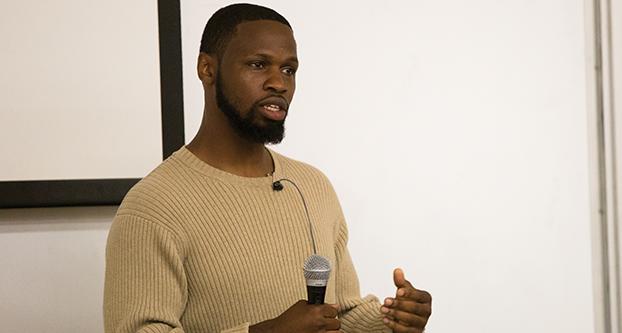After seven years on death row, Isaiah McCoy, an exoneree shared his experiences of life in and out of prison, and how they shaped him into who he is today.
Jenna Kieckhaefer, a psychologist and assistant professor in the department of criminology, met McCoy in March at a conference in San Diego and made arrangements for his speech at Fresno State on April 19.
Kieckhaefer is currently teaching a wrongful convictions course and taught her course with McCoy’s recent case ruling. “I wanted to, if possible, bring in somebody that’s been exonerated so that they can actually speak to someone and hear their story. I said I was a professor and immediately he [McCoy] said ‘if you want I can come speak to your class’,” she said.
McCoy, now 29, earned his GED, in prison, when he was 16. He will be awarded several honorary degrees for his life experiences which will help him attend law school.
Once in law school and working in the judicial system, McCoy plans to focus on youth — the stage in people’s life where he believes positive guidance can change the outcome of an individual — abolishing the death penalty and ending mass incarceration.
Abandoned by his parents at the age of seven, McCoy took to the streets and cared for himself the only way he knew and had learned from others. “There was no question that I sold drugs, there’s no question that at one point I lived the life of a gangster, I have a criminal record that dates back to when I was nine,” he said.
Amy Ramos, an athletic training major, said she felt a connection through what McCoy had shared.
“I know what it feels like to be at the bottom,” Ramos said. “My parents were immigrants and I had to be kind of like the first one to step forward. He [McCoy] had nothing and he still came out and he survived and here he is going to law school and getting awards.”
Alone on the streets, McCoy joined the only type of support system available to him — gangs. McCoy said he did what he did because the only way he would have something to eat was by selling drugs.
McCoy believes that correctional facilities are not doing what they were intended to do, which is to correct. He believes correctional facilities, with the appropriate resources, can rehabilitate inmates and make them positive members of society.
Framed for murder by his nephew, McCoy’s foreseeable outcome was the death penalty. His friends and family knew he was innocent, but the district attorney’s office thought otherwise. After some troubles with the DA’s case, McCoy’s judge ultimately found the flaws in the DA’s case and McCoy was acquitted of the charges.
McCoy said he holds no grudges against his nephew or the District Attorney. In fact, because of them, he was able to escape from his previous ways. After deciding to leave the East Coast and to settle with his brother in Los Angeles, McCoy now goes around the country sharing his experiences.
Next, McCoy plans to give a speech in Hawaii and will continue sharing his life-changing experience with others wanting to pursue a career in the criminal justice system.





Jim Jensen • Jan 17, 2018 at 11:28 pm
Too bad he went back to his criminal ways and tried to start a prostitution ring in Hawaii. Not exactly an example of virtuous living to be using as an example.